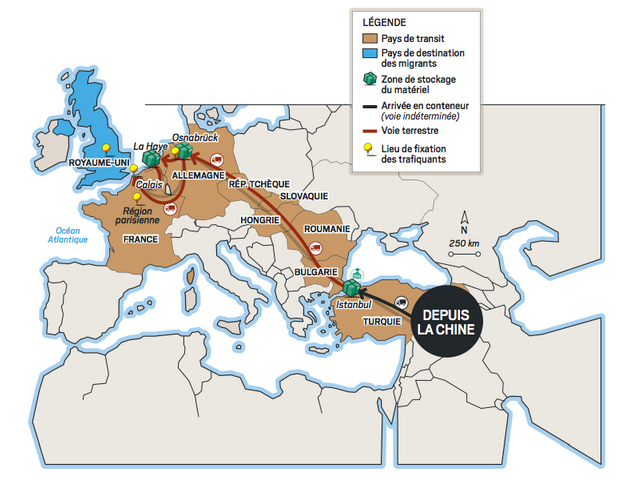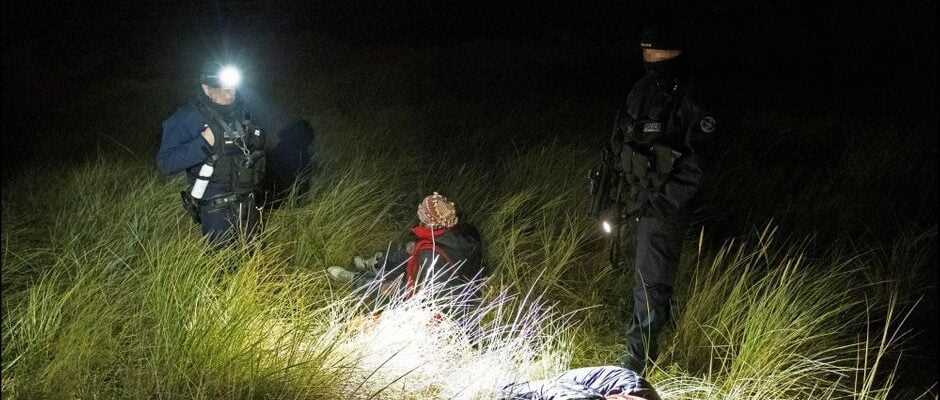Human trafficking is exploding, maintained by a network with complex ramifications.
With its cobbled streets, ancient taverns and Romanesque cathedral, Osnabrück looks like a peaceful city. Even in the gray and in the rain, passers-by and cyclists exchange polite smiles. It is not for nothing that it is nicknamed “the city of peace”. The expression dates from the 17th century, when the treaties of Westphalia were signed there, in part, ending the Thirty Years’ War.
Also read:Calais: with the damned of the sea
In recent months, the pretty town has seen its image of tranquility wither. On October 10, sleuths from the Bundespolizei, the German federal police, arrested two individuals carrying nautical equipment intended for illegal immigration. Five Chinese-made outboard motors, nine Zodiacs and around 100 life jackets were seized. The next day, one of the apprehended delivery men presented an invoice with the letterhead of a Turkish company and a delivery address in the Paris region. Why did this material from China make a detour via Osnabrück? Which Ile-de-France leisure center was it intended for? Has the information been verified? In any case, they were not transmitted. The magistrates saw nothing illegal in this import-export activity and the case was dismissed. The “delivery men” were freed and their equipment returned. They put it to good use: one of the engines reappeared six days later in Dover, England, on a Zodiac that had just smuggled migrants. This is what we learned from a police note that we were able to consult. Regularly, French, Belgians and British are moved by the phlegm of German magistrates.
Also read:Poland, the forest of hell
“In terms of illegal immigration, Germany is described as a comfort zone,” explains Xavier Delrieu, head of the Central Office for the Suppression of Irregular Immigration and the Employment of Untitled Foreigners (Ocriest). The judges consider that it is not an offense to sell boats which are used to illegally transport migrants from a country of the European Union to a country outside the EU. ”Result, in 80% of the files, the nautical material comes from beyond the Rhine. As for the Kurdish district of Osnabrück, it is so dynamic that an American brand is building a large hotel there. Everything is under construction: sidewalks, buildings, neon-lit stalls, hairdressers, manicures, kebabs, travel agencies… We walk in a dark street and we come across the latest model of Porsche Panamera, carelessly parked in front of a row of warehouses. It’s an open secret: the organizations that drive human trafficking are well established there. A merchant ode Damascus, to whom we ask directions, is astonished by our presence. He does not flinch when it is explained to him that the Kurds in his town are involved in the lucrative business of migrants. What intrigues him is our curiosity. “I am not Kurdish,” he said. I am a stranger to all of this. But you, be careful who you ask questions, it’s dangerous for you. “
Also read:Immigration: “We are subject to British policy”, according to Darmanin
In France, it is the divisional commissioner Xavier Delrieu who supervises the investigations into these networks. “The Iraqi Kurds hold 80% of the traffic in” small boats “, he tells us; the rest is divided between fairly artisanal Eritrean and Sudanese industries and opportunistic community networks. Last May, Vietnamese thus entered the circuit. “They landed overnight,” says an official based in Dunkirk. They pitched their tents, it was perfect. It looked like a scout camp! “As the Vietnamese pay more than the others – up to 3,000 euros the crossing -, confides an investigator, the traffickers like them. Our guys followed them and, thus, they were able to hook up a Kurdish network. The Vietnamese have since learned to sail on their own. Today, they would have disappeared from circulation.
Poor judicial cooperation serves the interests of German-based smugglers
Thirteen of their Kurdish smugglers are in prison. They were arrested on November 16 by the PJ, the Raid and the BRI at their respective homes in the Paris suburbs or in Calais and Dunkirk. This success for Ocriest, however, illustrates the limits of the exercise. To fight against international networks, European investigators must set up cross-border investigation units. For example, anti-mafia magistrates often have recourse to joint investigation teams (JITs), an instrument for judicial cooperation in criminal matters. As regards the fight against illegal immigration, European magistrates do not have the same reflex, and failures in matters of judicial cooperation serve the interests of smugglers. From their German rear bases, they only send light convoys: vans and vans. The many back and forth trips multiply the chances of success. The system is well established, and the number of boats is constantly increasing. According to figures from the Ministry of the Interior, from 330 successful crossings, attempts or interceptions of nautical equipment in 2019, we went to 1,326 in 2020 and 2,162 for the first ten months of 2021.
Commissioner Xavier Delrieu supervises the fight against illegal immigration, but comes up against the difficulties of cooperation between European judicial systems. © Eric Hadj / Paris Match
“In the beginning, since there were very few checks, the success rate was high. Three out of four boats were passing. Now about 50% of boats are intercepted. We are doing better, but we are far from having eradicated the phenomenon ”, assures Commissioner Delrieu. “Here, it’s the last line before arriving in England, dares our source in Dunkirk. We are like goalkeepers: we spread our arms, but there are too many starts for us to be able to prevent them all. Also, the police officers responsible for monitoring the coastline are under no illusions. When the weather conditions are good, the reception centers empty and it is the starting points located on either side of the departmental road 940, along the coast, which fill up. Therefore, all means are good. On December 16, three Sudanese crossed the Channel in paddle boards. “They left at 4 am and arrived the next day around 11 am,” says Brigadier David, whose patrol we are following. Driving in his Volkswagen Amarok financed by the English, he points his thermal camera – also financed by the English – in search of illegals.
“At first, we saw Sudanese and Eritreans roaming the beaches, looking for boats and engines buried by Iraqi smugglers. It caused tensions in the camps which were still in favor of the Kurds, because they are armed. To avoid theft, smugglers now deliver the equipment once the candidates for exile have been regrouped. “The cars drop them behind the dunes and the smuggler arrives in another car,” said another policeman. It is the precise moment when it is necessary to intervene with the objective of seizing the material and the one who transports it. On the night of December 17, a Bulgarian was intercepted at Gravelines, two Syrians near Dunkirk and an Iraqi at Berck. All with nautical equipment. But more often than not, these arrests target small hands.

THE ODYSSEY OF CANOES The spare parts of boats intended for migrants transit from China to the heart of Europe © DR
“Sometimes migrants who have found a way to finance their own crossing or locals who want to make some money,” says our source. Thus, a Calaisien recruited by his sister, who was in a relationship with a Kurd, or a group of Nantes. It is still a fisherman from Dunkirk who made himself famous before being imprisoned. The professionals are something else… “These people have a lot of money and they are not afraid of anything, they refuse the controls and go through in force”, explains Brigadier David, who took part in a race- prosecution against them on July 10. “Two vehicles following each other joined a third which was coming in front. When we sandwiched them, they rushed at us. Then we chased them as far as Grande-Synthe and there, we saw them come out and sneak into the camp among the migrants. It was impossible to find them. “” In the camp, we cannot know who is who “, continues our source in Dunkirk. He mentions a Kurd, a kebab seller in Grande-Synthe for five years, of whom we cannot be sure whether or not he belongs to a network.
To identify the networks, we follow the financial flows
Sometimes, settling of scores makes it possible to identify the culprits. It happened in September, when an organization’s lieutenant was targeted by an assassination attempt in the Grande-Synthe camp. Two months later, retaliatory action was taken in… Osnabrück. But this time again, the investigators believe that the people concerned held rather secondary roles. “Network heads do not get their hands dirty,” explains Commissioner Delrieu, who underlines the interest in tracking down capital. Its investigators have often succeeded in identifying networks by tracking financial flows. But again, the smugglers are cautious. “They use the ‘hawala’ system: the minimum number of transactions at the place of operation. Everything is done at the starting point, between families. We would have to go as far as Iraqi Kurdistan to attack these networks at the root. Unthinkable.
“In our last case, the net profit from each crossing was 75,000 euros,” continues Commissioner Delrieu. With four crossings per month, that’s more than three million per year. And again, this only concerns the crossings. Groups based in Kurdistan monitor the much more expensive roads from Iraq. They thus amass tens of millions of euros. What to ensure in their country of good protections and to remain untouchable.
Any reproduction prohibited
